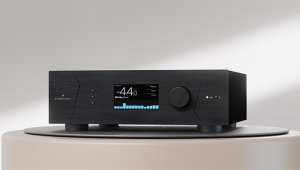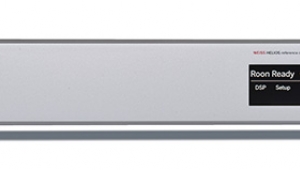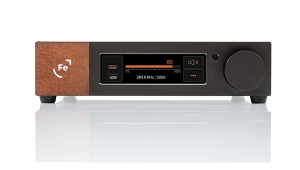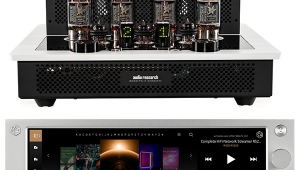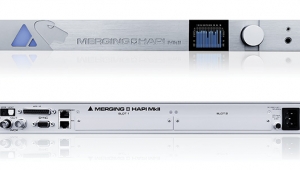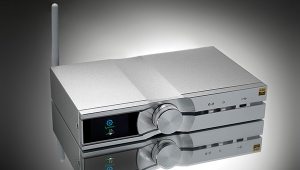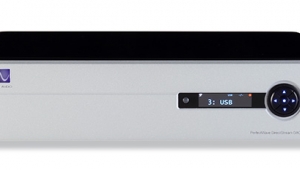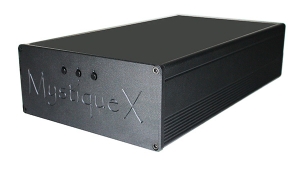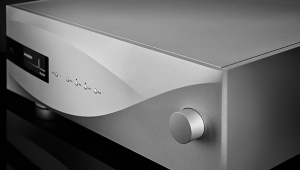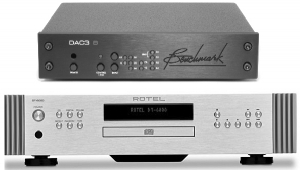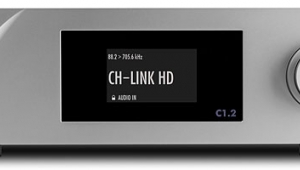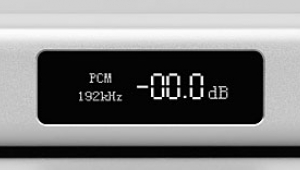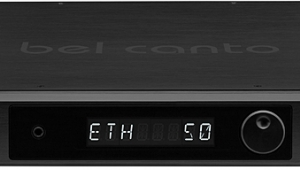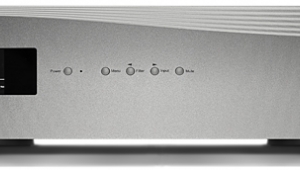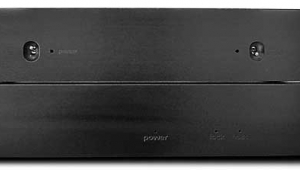| Columns Retired Columns & Blogs |
Wadia Digital 170iTransport digital iPod dock John Atkinson, June 2009
John Atkinson wrote about the Wadia 170 in June 2009 (Vol.32 No.6):
Wes Phillips was very impressed by this $379 iPod dock when he reviewed it in the October 2008 issue, feeling that it let him access the digital information from his Apple iPod with seemingly perfect transparency. The Wadia, you see, extracts the digital audio data from the iPod without processing it with the player's D/A processor; if you hook up the iTransport's S/PDIF output to a standalone D/A converter, you can get significantly higher sound quality than if you plug the iPod into a normal dock that can access only the Apple's analog output. (The Wadia does have analog outputs, but these are mere passthroughs from the iPod's analog outputs.)
I did verify that the Wadia's output is transparent to the audio data stored on the iPod's hard drive or RAM, but it wasn't possible to do any other measurements before the review was published. So when we were compiling the October 2008 "Recommended Components" list, I provisionally placed the 170 iTransport in Class A, based on WP's enthusiastic review, and pending my further experience of the component.
Wadia's iTransport is an ingenious device. It appears to use a Burr-Brown PCM2705 chip (the same as found in Apple's Airport Express), which is a USB-to-S/PDIF converter (footnote 1). I assume, therefore, that the Wadia is extracting the audio data from the iPod as a USB stream. As I explained in my review of Bel Canto's USB Link 24/96 in the May issue (p.97), unless a USB audio device can be allowed to control the sending of data from the host computer (in this case, an iPod), in what is called "asynchronous mode," the sample rate of the transmitted audio data will be correct only when averaged over quite a long time. In the short term, there will be timing uncertainty in the USB datastream, which by definition will result in jitter in the translated S/PDIF datastream.
However, it is no trivial matter to examine the timing quality of the raw data from a transport. First, I hooked up the Wadia's S/PDIF output to the digital input of an Audio Precision SYS2722 system (see www.ap.com and "As We See It" in the January 2008 issue), using my iPod Touch as the data source. The SYS2722 offers several means of examining the quality of an incoming datastream, but I'm not sure that its reference clock is sufficiently low in intrinsic timebase uncertainty to give readings that are accurate in absolute terms below a nanosecond or so. (I believe you can easily spend many tens of thousands of dollars on dedicated analyzers with clocks having low enough jitter to make absolute measurements down to tens of picoseconds possible.) But the SYS2772 will give relative measurements that can be compared.
Looking first at the level of jitter in the Wadia's S/PDIF output, with the iPod Touch sourcing the 16-bit J-Test data, the SYS2722 gave somewhat inconsistent results, depending on which test I was running. The lowest jitter I measured from the Wadia was 3.124 nanoseconds when I looked at the spectrum of the jitter from 50Hz to 100kHz; the highest was 7ns, which was when I examined the datastream's eye pattern (see May 2009, p.98). For reference, I looped the SYS2722's AES/EBU output back to its input. This gave measured jitter levels of 0.397ns and 3.17ns, respectively, for these two tests.
I then examined the performance of the RME soundcard installed in one of my test-lab PCs that I use as a standard worst-case source for processor tests, hooked up to the Audio Precision with 15' of plastic TosLink. This gave jitter levels of 3.27ns and 7.3ns, respectively. Finally, the word-clock output of my dCS 972 digital-to-digital converter, which comprises an AES/EBU datastream with all zeros in the data words, gave 0.347ns (347 picoseconds) on the jitter-spectrum test. It appears from these tests, therefore, that the Wadia's inherent jitter is about the same as that of the PC-RME-TosLink system and higher than the best data sources I have available.
For the second series of tests, I fed the Wadia's output to three D/A processors—a Benchmark DAC 1, a Musical Fidelity X-24K, and an Assemblage DAC 1—that I had used to review the Bel Canto USB Link 24/96, and looked at the spectra of their outputs with the Miller Audio Research Jitter Analyzer while the iPod Touch (footnote 2) played the Miller-Dunn J-Test signal through the Wadia. I then fed the processors the same signal from the PC-RME-TosLink source. Because of the differences in measurement techniques, the jitter numbers calculated by the Miller Analyzer cannot be compared to those produced by the Audio Precision, but they can be compared with each other.
As I have found in previous tests, the Benchmark offered superb rejection of jitter on the incoming datastream. The Miller Analyzer measured a low 263ps peak–peak of jitter with both sources, which is close to its resolution limit. Fed from the PC via Toslink, the Musical Fidelity processor gave a low 325ps p–p of jitter, but this increased to 4.28ns p–p when I replaced the PC with the iPod-Wadia combination. The Assemblage had the worst jitter rejection of the three processors, but paradoxically gave higher jitter from the PC source (16ns p–p) than from the iPod-Wadia (1.4ns p–p), though the latter is still high.
So while the two series of test I performed can't be considered definitive, I do believe they reveal that the Wadia 170 iTransport's S/PDIF data output has sufficiently high jitter that, to get the best sound quality from it, it must be used with a modern D/A processor having good jitter rejection. For his review, Wes Philips fed the Wadia's output to the digital input of a Simaudio Moon Evolution SuperNova CD player, which does have excellent jitter rejection. But if you don't have a megabux processor, I can recommend, in order of increasing price, the Cambridge DacMagic, the Benchmark DAC1, and the Bel Canto e-one DAC3.
A more appropriate rating in "Recommended Components" for the iTransport would therefore be Class B, which is still a strong recommendation. I can't think of a better way for audiophiles with iPods to share music with each other than Wadia's 170 iTransport feeding a high-end system through a high-quality DAC.—John Atkinson
Footnote 1: Although this chip includes digital filters and 16-bit DACs, these are not used by the 170 iTransport.
Footnote 2: Measured with the Miller Analyzer, the iPod Touch offered 828ps p–p of jitter, about four times more than the best players I have measured.
- Log in or register to post comments
